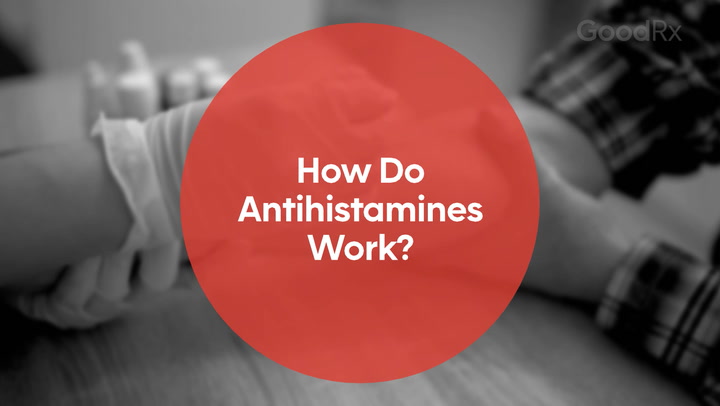
8 Zyrtec Interactions: Alcohol, NyQuil, and More
Key takeaways:
Zyrtec (cetirizine) is an over-the-counter (OTC) antihistamine used to treat allergy symptoms. It interacts with several medications and substances.
Zyrtec interacts with alcohol, other oral antihistamines, and opioids. It also interacts with sleep medications and many “nighttime” cold medications. Many Zyrtec interactions raise the risk of severe drowsiness and dizziness.
It’s safe to take Zyrtec with many OTC medications, including ibuprofen (Advil, Motrin) and Tylenol (acetaminophen). Always check with a healthcare professional before starting something new while taking Zyrtec.
Access savings on related medications
Table of contents

Zyrtec (cetirizine) is an over-the-counter (OTC) antihistamine. It’s a popular choice for treating allergy symptoms, such as runny nose and sneezing.
Many people take Zyrtec with mild or no side effects. But certain medications and substances can raise the risk of side effects. For instance, taking Zyrtec with opioids can raise the risk of drowsiness or dizziness. But what other Zyrtec interactions should you be aware of?
Zyrtec interactions at a glance
The following substances and medications interact with Zyrtec:
Alcohol
Other oral antihistamines, such as Benadryl (diphenhydramine)
Many “nighttime” cold medications, such as NyQuil (acetaminophen / dextromethorphan / doxylamine)
Opioids, such as oxycodone (Roxicodone, OxyContin)
Sleeping medications, such as zolpidem (Ambien)
Other medications that cause drowsiness, such as muscle relaxers
Gabapentin (Neurontin)
Wakix (pitolisant)
This isn’t a complete list. So be sure to check with your healthcare team before starting a new medication with Zyrtec. It’s a good idea to share a medication list with them too. This can help your healthcare team manage interactions.
Below, we’ll dig deeper into what you should know about these eight notable Zyrtec interactions.
1. Alcohol
It’s best to avoid alcohol while taking Zyrtec.
Alcohol slows down your central nervous system (brain and spinal cord). This can make you feel sleepy and less coordinated. Zyrtec can also cause drowsiness for some people who take it. Taking Zyrtec with alcohol can worsen these side effects.
Completely avoiding alcohol is recommended when taking Zyrtec. But this may not be realistic for you. Ask a healthcare professional whether it’s OK for you to consume an occasional drink while taking Zyrtec.
2. Other oral antihistamines
It’s common to take more than one allergy medication. But not all combinations are safe. Don’t take Zyrtec with other oral antihistamines unless a healthcare professional tells you it’s OK.
All about side effects: Many Zyrtec (cetirizine) interactions raise the risk of side effects. Read about notable Zyrtec side effects.
Combining allergy medications: Pharmacists explain which allergy medications you can safely mix together.
Alcohol and antihistamines: Here’s why you shouldn’t drink alcohol while taking antihistamines such as Zyrtec.
Examples of other oral antihistamines include:
Allegra (fexofenadine)
Benadryl
Chlorpheniramine
Claritin (loratadine)
Dramamine (dimenhydrinate)
Hydroxyzine (Vistaril)
Xyzal (levocetirizine)
Antihistamines can cause side effects, such as drowsiness, dry mouth, and headache. Taking more than one at a time can raise the risk of experiencing these effects. Rarely, combining oral antihistamines can lead to an antihistamine overdose. Symptoms may include hallucinations, fever, and a racing heart.
If you want to switch from Zyrtec to a different antihistamine, wait at least 24 hours after your last dose of Zyrtec.
3. Certain cold medications, such as NyQuil
Combination cold medications can be convenient. But they’re not always safe to take if you also take Zyrtec. Many “nighttime” cold medications contain an antihistamine that causes drowsiness. You shouldn’t take Zyrtec with other oral antihistamines.
Popular cold medications that interact with Zyrtec include:
NyQuil (acetaminophen / dextromethorphan / doxylamine)
Coricidin HBP Maximum Strength Night Cold & Flu (acetaminophen / dextromethorphan / doxylamine)
Delsym Nighttime Cough (acetaminophen / dextromethorphan / triprolidine)
Mucinex Nightshift Cold and Flu (acetaminophen / dextromethorphan / triprolidine)
Robitussin Maximum Strength Nighttime Cough DM (dextromethorphan / doxylamine)
Be sure to read the OTC label before taking a medication. If you see an antihistamine listed as an active ingredient, avoid it while taking Zyrtec. If you’re unsure whether your medication contains an antihistamine, ask a pharmacist. They can recommend a product that’s safe to combine with Zyrtec.
4. Opioids
Ask a healthcare professional before taking Zyrtec and an opioid, such as oxycodone. Opioids can cause drowsiness and dizziness. Combining them with Zyrtec can raise the risk of these side effects.
Keep in mind that a healthcare professional may tell you it’s OK to take both Zyrtec and an opioid. But everyone’s risks with this combination are different. For instance, you may be more sensitive to this interaction’s effects if you’re age 65 or older. A healthcare professional can help you decide if it’s OK for you to take both Zyrtec and an opioid.
5. Sleep medications
Ask your healthcare team if you can take Zyrtec with sleeping medications. Zyrtec can cause drowsiness for some people on its own. Taking it with a sleep aid can make drowsiness more severe.
Examples of sleep medications include:
“Z-drugs,” such as Ambien (zolpidem)
Rozerem (ramelteon)
Orexin receptor antagonists, such as Quviviq (daridorexant)
OTC sleep aids, such as ZzzQuil (diphenhydramine) and Unisom SleepTabs (doxylamine)
Melatonin
As with opioids, your healthcare team may give you the OK to take both Zyrtec and a sleep medication. But it’s best to check with them before combining these medications on your own.
6. Other medications that cause drowsiness
There are many other medications that cause drowsiness as a side effect. Taking Zyrtec with any of them can make sleepiness more severe. Always ask a healthcare professional before combining them.
Examples of other medications that cause drowsiness include:
Muscle relaxers, such as cyclobenzaprine
Some antidepressants, such as trazodone and doxepin (Silenor)
Other anti-seizure medications, such as oxcarbazepine (Trileptal)
Benzodiazepines, such as alprazolam (Xanax)
Your healthcare team can tell you if it’s OK for you to take Zyrtec with other medications that cause drowsiness. Be sure to watch for excessive sleepiness if they say you can take both.
7. Gabapentin
Gabapentin (Neurontin) is a medication that treats nerve pain and seizures. You shouldn’t take Zyrtec and gabapentin unless a healthcare professional tells you to. These medications interact in two different ways.
Gabapentin commonly causes drowsiness and dizziness. Taking it with Zyrtec may worsen these side effects. And certain people, such as older adults, may have a greater risk of this when taking both medications.
Zyrtec can also lower gabapentin levels in your body. This means that gabapentin may not work as well as expected. And if you’re taking gabapentin for seizure management, this interaction could possibly trigger seizures.
8. Wakix
Wakix (pitolisant) treats excessive daytime sleepiness in people living with narcolepsy. It works by attaching to certain histamine receptors (binding sites) in the brain. It also raises levels of histamine. So you shouldn’t take antihistamines that attach to these same receptors.
Zyrtec is able to bind to these histamine receptors in the brain. This means it may stop Wakix from working as well as it should. So it’s recommended to avoid this combination.
Make sure your prescriber knows if you take Zyrtec before you start Wakix. They’ll likely recommend an alternative to Zyrtec to help you avoid this interaction.
Can you take Zyrtec and ibuprofen together?
Yes, you can take Zyrtec and ibuprofen (Advil, Motrin) together. In fact, this combination may be helpful if your allergy symptoms include sinus headaches.
Just be sure to read the OTC label of your products carefully. Ibuprofen is sometimes combined with an antihistamine in a single pill. One example is Motrin PM (ibuprofen / diphenhydramine). You shouldn’t take these combination products and Zyrtec at the same time.
Can you take Zyrtec and Tylenol together?
Yes, you can take Zyrtec and Tylenol (acetaminophen) together. These medications don’t interact.
But there are many products that combine Tylenol’s active ingredient with other antihistamines. For example, Tylenol Nighttime Severe Cough + Sore Throat (acetaminophen / dextromethorphan / doxylamine) contains an antihistamine. You shouldn’t take this product with Zyrtec.
The bottom line
Zyrtec (cetirizine) is an over-the-counter antihistamine that treats allergy symptoms. Zyrtec interacts with alcohol, opioids, and other oral antihistamines. It also interacts with sleeping medications and many nighttime cold medications. Your risk of drowsiness is higher if you take Zyrtec with these other medications and substances. Your healthcare team can help you manage or avoid Zyrtec interactions.
Why trust our experts?



References
Costa, A. C. C., et al. (2020). Cetirizine reduces gabapentin plasma concentrations and effect: Role of renal drug transporters for organic cations. The Journal of Clinical Pharmacology.
Harmony Biosciences. (2024). Wakix- pitolisant hydrochloride tablet, film coated [package insert].
Kong, W., et al. (2024). High-risks drug adverse events associated with Cetirizine and Loratadine for the treatment of allergic diseases: A retrospective pharmacovigilance study based on the FDA adverse event reporting system database. Clinical and Translational Allergy.
Naqvi, A., et al. (2024). Cetirizine. StatPearls.
Renko, A., et al. (2022). Unintentional cetirizine overdose causing anticholinergic syndrome. The American Journal of Emergency Medicine.
Was this page helpful?
Related Articles
Browse medications
View AllResearch prescriptions and over-the-counter medications from A to Z, compare drug prices, and start saving.




























